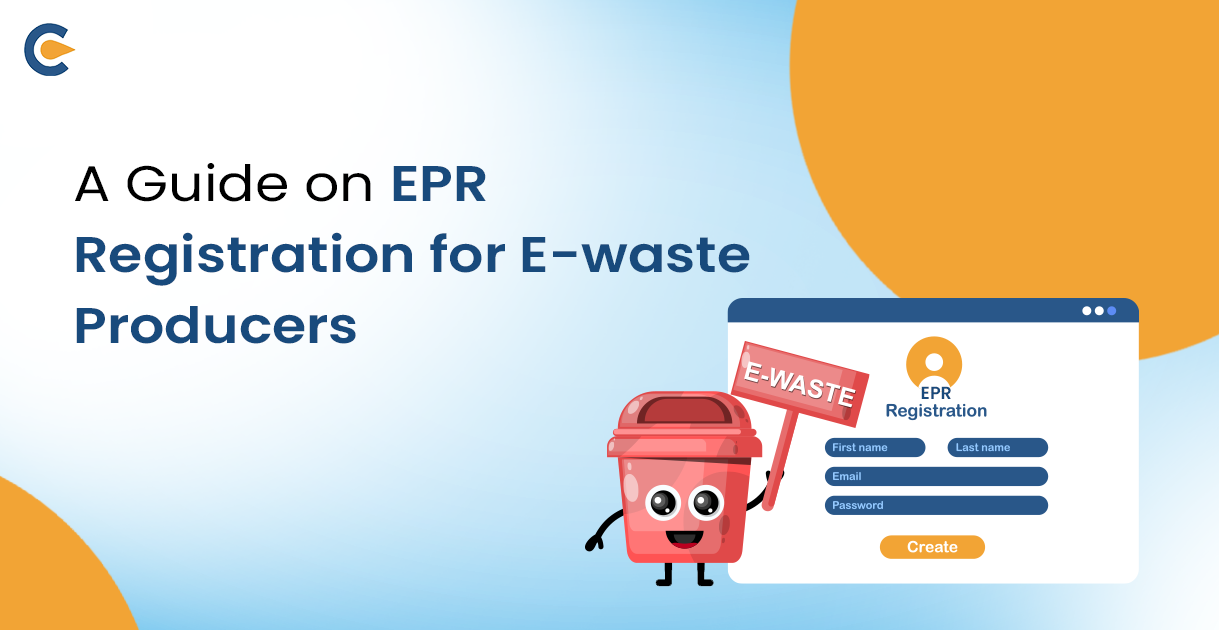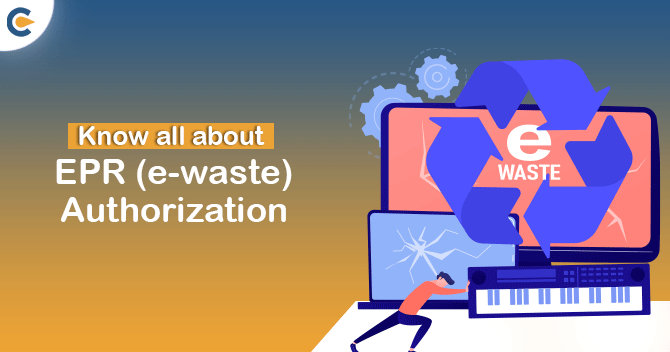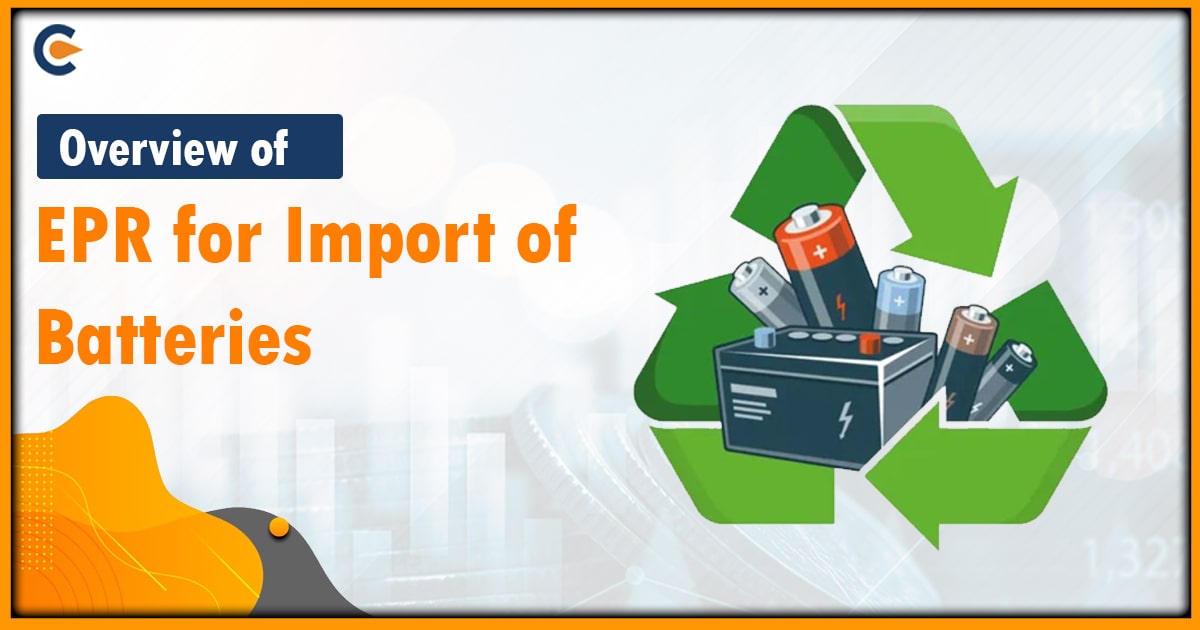EPR for e-waste producers refers to extended producer responsibility for the country’s producers, manufacturers, and exporters of electronic products. EPR authorization is necessary to perform the trade, manufacturing, and sale of these goods in the country without any penalties and legal complications. Even the dealers of refurbished and second-hand electronic items need to furnish the EPR certification from the authorities. They have to comply with the regulations and ensure that their disposal is safe and unharming to the environment. The government established the first law in 2011, based on Extended Producer Responsibility (EPR), which holds manufacturers accountable for managing the last stage of a product’s life in an eco-friendly manner and ensuring ecologically sound management. Every producer/importer of electric or electrical equipment must have an Extended Producer’s Responsibility (EPR) certificate or license. It pushes producers to create environmentally friendly products. The Central Pollution Control Board (CPCB) of the Ministry of Environment and Forests, Government of India, issues EPR authorizations.
Importance of EPR for E-waste Certification
The importance of EPR for E-waste certifications is –
- EPR is responsible for the promotion of recycling, reusing, and refurbishing electrical products that are beneficial for the producers and manufacturers in cutting the manufacturing cost of the devices.
- EPR certification ensures that the e-waste produced from electrical appliances is disposed of securely and doesn’t harm the environment.
- Through EPR authorization from the CPCB, the value and goodwill of the manufacturer and seller of the product increase.
- EPR has ensured that the country is aiming towards sustainable development and there is less e-waste, which ultimately secures the country’s natural resources.
Application Procedure of EPR for E-waste Producers
The application procedure of EPR for E-waste producers involves the following steps –
- To get the EPR Certification, the producers have to complete all the documents that are required along with the EPR plan, which will be implemented by them.
- The application form has to be filled in the prescribed format to get the EPR authorization.
- The application has to be sent to the authorities in offline mode as well, discussing the detailed EPR for the e-waste plan and the details of the producer.
- The EPR plan and the documents submitted will be evaluated by the CPCB officials for EPR authorization, and if they find any documents missing or misfiled, then it will be notified to the applicant within 25 days of application and will be asked to be amended.
- EPR for E-waste certification is granted by the CPCB chairman after the CPCB officials are done with their scrutiny and find everything as per the regulations.
EPR for E-waste Rules, 2022
Certain rules need to be followed for EPR for E-waste producers. In November 2022, E-waste (Management) Rules were laid down by the Ministry of Environment, forests, and Climate Change that came into effect from 1st April 2023. These are –
- The producers, manufacturers, recyclers, and re-furbishers must register on the portal and also collect and dispose of the E-waste generated during their work. Each must register under their specific category of nature of work, and if someone is working on more than one field, then it needs to do the portal registration for every act. Without EPR registration, a business is deemed illegal.
- The annual and quarterly reports have to be filed by these entities to report the E-waste management to the authorities. These reports must be filed in the portal in a prescribed manner within the month following these timelines.
- EPR for E-waste is mandatory for all the producers, manufacturers, recyclers, and re-furbishers who are into the sale, purchase, recycling, manufacture, refurbishing, and dismantling of the E-waste produced in the country.
- These entities dealing in E-waste need to pay the registration fee along with the annual maintenance fee to the CPCB as determined by them from time to time. Entities in the sale, purchase, recycling, manufacture, refurbishing, and dismantling industries have to pay such fees depending on the amount of e-waste they handle in that period.
- Schedule I lists the electronic items that require the EPR certification and registration on the portal, and these items have to comply with the targets set in Schedule III & IV.
- If any entity has registered under the E-waste (Management) Rules 2016, it needs to migrate from that to the new rules through a procedure set by the CPCB on the Steering Committee’s approval.
Conclusion
EPR for E-waste Producers is a much-needed certification to continue with the business in the country. Since the country has to look forward to meeting the goals of sustainable development, these steps are necessary to ensure the health and safety of the people, natural resources, and the environment. E-waste contains very hazardous substances and emits harmful radiation if not disposed of in a manner stated by the CPCB. This is why there are very heavy penalties for not complying with the terms mentioned in various governing rules and regulations by the ministry. With the country taking many steps towards reducing e-waste, it is now time that we also step up and use electronics in a better manner. We should not throw them away in our surroundings to help the cause.
Corpbiz can help your business entity dealing in this e-waste get its EPR certification approved in a hassle-free way. We have been known to provide these services to our customers for a very long period now, and customer satisfaction is at the top. All the documentation process would be done by our executives to get you the certification and compliance with regulations in time. We will assist you in filing the annual and Quarterly reports on time as well.
Frequently Asked Questions
Who authorizes the issuance of EPR certification?
The EPR certification is authorized by the Central Pollution Control Board (CPCB) under the Ministry of Environment, Forests, and Climate Change.
When and why was EPR for E-waste introduced in India?
EPR was introduced in the country in 2011. It came to promote the idea of sustainable development, reduce hazardous e-waste material, and monitor its safe disposal.
In how many days can an entity receive EPR for E-waste certification?
EPR for E-waste certification can be granted to the entity within 120 days of the application if the documentation made is as per the prescribed form. If they find any documents missing or misfiled, then they will notify the applicant within 25 days of application and will be asked to amend them.
What is the period of EPR authorization?
The EPR authorization is done for a period of 5 years.
What is the importance of EPR E-waste?
EPR means Extended Producer Responsibility, and in terms of E-waste, it means that the producer, manufacturer, recycler, seller, and re-furbisher has the responsibility to safely dispose of the E-waste generated from the electronics. This holds importance in maintaining the environmental balance and protecting the non-renewable natural resources of nature to promote sustainable development.
How to get the EPR certificate in Delhi for a manufacturing unit?
To get the EPR certification, you can contact our executives, who will provide the best guidance to get your EPR authorization in time. You just need to provide the fee and the documents required for the grant of certification.
What is the average life of an air-conditioner and a washing machine?
The average life span of an air-conditioner is about ten years, and that of a washing machine is nine years.
What is the fee for an e-waste license in India?
The fee for an e-waste license in India is Rs 5,000. This fee can be paid online or by depositing through Demand Draft in the CPCB office.
When can we file an annual report?
The annual reports should be filed with the authorities by 30th June of every year for the reports of the previous year. For Example- the annual report for the year 2023-2024 should be filed before 30th June 2024.
Is e-waste import banned in India?
Yes, the import of e-waste is banned in India by the government through Schedule VI of E-waste (Management), Rules 2022.
Read Our Article: Need To Know About EPR Compliance For Manufacturers











